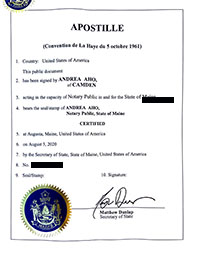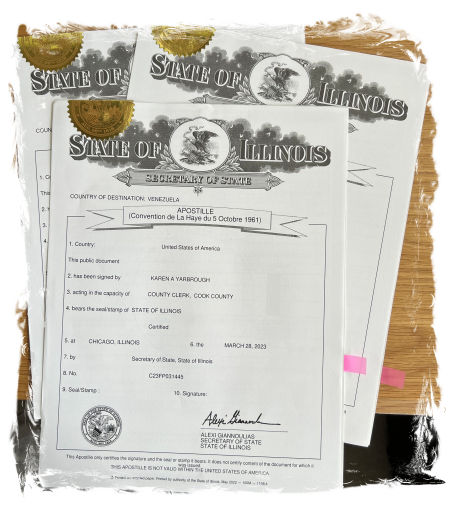Apostille Houston Solution-- Qualified Paper Verification for All Requirements
Apostille Houston Solution-- Qualified Paper Verification for All Requirements
Blog Article
Recognizing the Apostille Refine: A Comprehensive Guide to International File Verification
Browsing the elaborate landscape of worldwide record authentication can be daunting without a clear understanding of the apostille procedure. This overview meticulously describes the needed actions, from recognizing which documents call for qualification to submitting them for verification by the Competent Authority. Comprehending the significance of an apostille and identifying prospective risks, such as insufficient entries and language obstacles, can significantly improve the verification trip. What specifically specifies an apostille, and why is it so crucial for documents destined for Hague Convention countries? These questions form the foundation of our exploration into this important lawful procedure.
What Is an Apostille?
An apostille is a main qualification that validates the credibility of a file for use in another nation. This qualification, provided by a marked authority in the country where the document originated, guarantees that the document is identified as legitimate and legitimate in the global field. The process of obtaining an apostille entails a number of actions, including the confirmation of the paper's signatures, seals, and stamps by appropriate governmental bodies.
The apostille works as an internationally recognized kind of verification, made possible by the Hague Convention of 1961. This treaty, formally called the Hague Convention Eliminating the Requirement of Legalisation for Foreign Public Papers, systematizes the procedure of paper accreditation among participant nations. The apostille itself is a standard certificate that consists of particular info, such as the releasing authority, the native land, and the date of issuance.
It is very important to note that not all papers are eligible for an apostille. Generally, public papers like copyright, marital relationship licenses, court orders, and academic diplomas qualify for this certification. Personal files, such as agreements and contracts, may require notarization and added steps to certify.
Relevance of Apostille
Recognizing what an apostille is establishes the stage for appreciating its relevance in international ventures. houston tx apostille. An apostille, essentially a type of qualification released by a marked authority, validates the authenticity of a record for use in international nations that are signatures to the Hague Apostille Convention. This standard process gets rid of the need for more legalization by consular offices or consulates, therefore simplifying international purchases
It guarantees the trustworthiness and approval of necessary files-- such as copyright, marriage licenses, and instructional diplomas-- throughout borders. For services, it helps with the smooth conduct of worldwide trade, mergers, and acquisitions by giving a relied on method of paper confirmation.
In addition, an apostille enhances lawful protection and compliance. Federal governments and organizations can confidently rely upon the authenticity of files bearing an apostille, minimizing the danger of scams and misrepresentation. Hence, the apostille functions as an essential tool in advertising worldwide participation and trust fund. Its duty in fostering effective and safe and secure worldwide purchases underscores its indispensable worth in today's interconnected globe.
Papers That Call For Apostille
When taking part in worldwide deals or legal issues, details files frequently demand the authentication provided by an here apostille. This ensures their recognition and acceptance in nations that are signatures to the Hague Apostille Convention. Commonly, personal documents such as copyright, marriage certificates, and death certifications need an apostille, specifically when they are made use of for processes like migration, marriage abroad, or worldwide probate matters.
Educational papers are another group often requiring apostilles. Diplomas, records, and academic documents often need this verification for purposes such as seeking additional education and learning, employment, or professional licensing in a foreign nation (houston tx apostille). This step guarantees that the files are acknowledged as reputable and legitimate
Lawful papers, consisting of powers of attorney, affidavits, and court orders, additionally frequently demand apostilles. Business documents such as certifications of incorporation, bylaws, and industrial contracts might need an apostille to help with international profession, establish international branches, or engage in cross-border lawful procedures.
Steps to Acquire an Apostille

Getting an apostille involves a multi-step procedure that guarantees the authenticity and approval of your papers in foreign nations. The first action is identifying which papers need an apostille. houston tx apostille. Common files consist of birth certifications, marriage have a peek at this site licenses, scholastic transcripts, and business records
As soon as recognized, the file should be accredited by the appropriate releasing authority. After qualification, the paper needs to be submitted to the assigned Competent Authority in the paper's nation of beginning.
The entry process generally needs a finished application, the original paper, and a cost. Some jurisdictions may use the option of expedited handling for an extra fee. Upon effective verification, the Competent Authority will certainly affix the apostille find this certification to the paper, consequently confirming its credibility.
Common Challenges and Solutions
Navigating the apostille process can provide a number of typical obstacles that, otherwise appropriately addressed, may postpone or complicate document verification. One regular issue is the submission of incorrect or insufficient papers. Each nation has details demands for the sorts of papers that can be apostilled, and any kind of variance from these can cause rejection. Guaranteeing that all records are exact and full prior to entry is important.
An additional usual obstacle is understanding the varied processing times. Handling times can vary significantly between nations and even between different regions within the same nation. It is essential to account for these variants when intending the apostille procedure to prevent unforeseen delays.
Additionally, language obstacles can pose considerable obstacles. Documents in an international language usually call for licensed translations, and any mistakes in translation can lead to further difficulties. Involving a professional translation solution can reduce this danger.

Final Thought
Grasping the apostille process significantly boosts the performance of worldwide file verification. By understanding the need of recognizing and accrediting required records, and navigating the submission to the Competent Authority, the procedure comes to be a lot more manageable. Recognition of typical challenges, such as insufficient submissions and language obstacles, better aids in preventing possible delays. Making certain papers are properly apostilled facilitates their acceptance in Hague Convention signatory nations, thereby sustaining seamless worldwide legal and management treatments.
Report this page